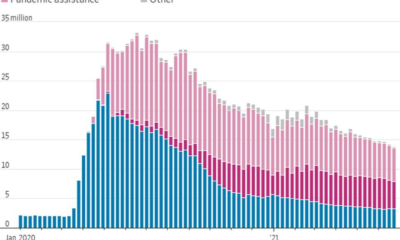Real Estate
6 Questions To Ask Before Buying A House In This Hot Real Estate Market

Is now the time to buy that perfect house in Palm Springs or wherever you are looking to be living?
The housing market in most of this country has been highly competitive for quite some time. There are way more people looking to buy a new home than those looking to sell. Many buyers and sellers find themselves in situations with multiple offers and homes selling for seemingly unbelievable prices. This has left many would-be homebuyers wondering if now is a good time to be buying a house. Keep reading for six questions to ask yourself before jumping into the real estate market.
Are you willing and able to live in the house for at least five years? Extra credit if you can handle five years here. Having a house that meets your needs and is in a location you like will make owning a home much more palatable when inevitable home repairs come up or if house prices drop.
Under normal circumstances (we are not in a normal housing market at the moment), it will usually take a few years to recoup the cost of buying and selling a home. So, the longer your time frame, the greater your odds of making money if or when you decide to sell your home.
How much house do you really need? More importantly how much house can you afford?
For most people, spending more than 28% of gross income on housing will leave you house poor. There are exceptions. For example, someone buying a duplex or multi-unit property or having a roommate could help make homeownership more affordable. Also, in many scenarios, the self-employed appear much poorer on a mortgage application than in real life.
Your mortgage broker can likely get you a mortgage at 43% of your gross income, but that won’t leave much money to enjoy life or even do things like eating after taxes.
I’m not saying you have to put 20% down but having the ability to do so shows that you are likely in a position to afford to own a home. Side note, in the current market, the larger your down payment, the more competitive your offer will be (assuming many of you are buying a home with multiple offers).
Home maintenance can be costly. Not to mention mortgage payments and property taxes.
I purchased my first home way back in 2007, right before the worst of the financial crisis. My house was likely underwater (worth less than I paid) for a good five years. While it wasn’t fun, I liked where I lived and was able to weather the storm. On a happier side note, my mortgage is less than half what it was when I purchased the home, thanks to lower interest rates.
Honestly, I wasn’t happy to see my house value decline, but there wasn’t much I could do about it at the time. Thankfully, I kept the house, and it is now worth more than double what I originally paid for it.
Depending on your situation, now may be a perfect time. For others, buying now may be a terrible decision. In many real estate markets, the supply of houses for sale is far outstripped by demand. You may be buying at relatively high values, but on the flip side, I would expect mortgage rates to be higher in 5 years than they are today.
While I know being patient isn’t fun, don’t rush out and get in a bidding war for a house you aren’t sure you want. However, if your dream home comes on the market and you can afford it, don’t lose out on it just because you aren’t getting it for a dream price.
Home prices are up, and so is the cost of remodeling your home. The supply chain issues make it harder to get items, and all the best contractors are busy. Just be cautious before you take on a house with a larger project than you can handle or that your budget can bear. The prices you see on HGTV to redo a home are likely far less than you will find in the real world.
As a fiduciary financial planner, I think owning a home is a smart long-term financial move. There are better ways (in my opinion) to build wealth, so not owning a home doesn’t mean you can’t be building wealth over time.
Real Estate
Central banks end crisis-fighting measure as bank tumult recedes

Last month, the collapse of Silicon Valley Bank, the second-largest bank failure in US history, unleashed broader panic and raised fears the global financial system would seize up. Now, central banks are signaling that their immediate concerns have eased.
The Bank of England, the Bank of Japan, the European Central Bank and the Swiss National Bank said Tuesday that they would end daily measures to boost the flow of US dollars to lenders around the world. They cited “improvements in US dollar funding conditions” and “low demand” at recent operations aimed at providing liquidity.
Starting May 1, those operations will once again be held weekly, a decision made in consultation with the US Federal Reserve, the primary source of dollars. The frequency could increase again if needed, the four central banks said.
“These central banks stand ready to readjust the provision of US dollar liquidity as warranted by market conditions,” they said in their statements.
Policymakers sprung into action in March after the collapse of Silicon Valley Bank and Signature Bank in the United States sparked an acute bout of turmoil in the global banking sector. The tumult also nearly took down Credit Suisse (CS), a globally important but troubled bank, forcing Swiss authorities to arrange an emergency sale to rival UBS (UBS).
Hours after the Credit Suisse takeover was announced, the Fed said it would work with central banks in the United Kingdom, Japan, Canada, Switzerland and the European Union to make sure lenders there had access to the dollar liquidity they needed.
That meant making greater use of dollar swap lines, or agreements between the Fed and other central banks to provide dollars in exchange for, say, euros or yen.
Swap lines are a key instrument in central banks’ toolbox aimed at preserving financial stability and keeping credit flowing to households and businesses.
Real Estate
Fukushima’s fishing industry survived a nuclear disaster. 12 years on, it fears Tokyo’s next move may finish it off

It is still morning when Kinzaburo Shiga, 77, returns to Onahama port after catching a trawler full of fish off Japan’s eastern coast.
But the third-generation fisherman won’t head straight to market. First, he’ll test his catch for radiation.
It’s a ritual he’s repeated for more than a decade since a devastating earthquake and tsunami triggered a nuclear meltdown at the Fukushima Daiichi power plant in 2011, spewing deadly radioactive particles into the surrounding area.
Radiation from the damaged nuclear plant leaked into the sea, prompting authorities to suspend fishing operations off the coast of three prefectures that had previously provided Japan with half of its catch.
That ban lasted over a year, and even after it was lifted, Fukushima-based fishermen like Shiga were for years mostly limited to collecting samples for radioactivity tests on behalf of the state-owned electricity firm Tokyo Electric Power Company, or TEPCO, rather than taking their catches to market.
Ocean currents have since dispersed the contaminated water enough that radioactive cesium is nearly undetectable in fish from Fukushima prefecture. Japan lifted its last remaining restrictions on fish from the area in 2021, and most countries have eased import restrictions.
Shiga and others in the industry thought they’d put the nightmare of the past years behind them.
So when Japan followed through on plans to gradually release more than 1 million metric tons of filtered wastewater into the Pacific Ocean from the summer of 2023 – an action the government says is necessary to decommission the plant safely – the industry reeled.
The Japanese government and the International Atomic Energy Agency (IAEA), a United Nations body promoting the peaceful use of nuclear energy, say the controlled release, which is expected to take decades, will meet international safety regulations and not harm the environment, as the water will be treated to remove radioactive elements – with the exception of tritium – and diluted more than 100 times.
But with the deadline for the planned water release looming this summer, Fukushima’s fishermen fear that – whether the release is safe or not – the move will undermine consumer confidence in their catches and once again threaten the way of life they have fought so hard to recover.
Real Estate
Video shows US police at wrong house before shooting homeowner

Robert Dotson, 52, was killed by police on April 5 in New Mexico after officers responding to a domestic violence report arrived at the wrong house.
New Mexico police officers realised they were at the wrong address just moments before the front door opened and they fatally shot the armed homeowner, then exchanged gunfire with his wife, according to newly released body camera video of the April 5 shooting.
Robert Dotson, 52, was killed in Farmington, a city of 47,000 people in the southwestern US state, after officers on their way to a domestic violence call went to the wrong house.
The Farmington Police Department released several videos on Friday, including footage captured by body cameras worn by the three officers who fired their weapons.
“All of us – the men and women of the Farmington Police Department – recognise the severity of this incident,” Police Chief Steven Hebbe said in a statement.
“Once again, we wish to express our condolences to the Dotson family, and as your chief of police, I wish to convey how very sorry I am that this tragedy occurred,” Hebbe said.
-

 Business3 years ago
Business3 years agoHyundai Leads Industry in U.S. News & World Report 2023 Best Cars for the Money Awards
-

 Innovation3 years ago
Innovation3 years agoJay-S ventures into the urban genre with “Bailar en la Playa” his latest production
-

 Business3 years ago
Business3 years agoThree Questions Small Business Owners Should Ask In Creating A Workplace Culture – Forbes
-

 Business3 years ago
Business3 years agoA Fintech Makes It Easy For Small Businesses To Offer 401(k) Retirement Benefits – Forbes
-

 Business3 years ago
Business3 years agoBritain’s Small Businesses See Better Times Ahead But Is Their Optimism Justified? – Forbes
-

 Money3 years ago
Money3 years agoCharlie Crist leads Democratic gubernatorial field again in money chase – Florida Politics
-

 Money3 years ago
Money3 years agoTesting New Tools for Horizon Worlds Creators To Earn Money
-

 Business3 years ago
Business3 years agoSmall Business Labor Shortage – Forbes
